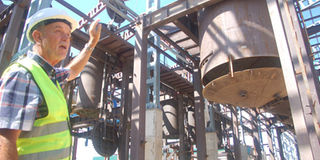Coast farmers’ hopes revived

Mr Jonathan Parkin, General Manager Kwale International Sugar Company. Photo/FILE
What you need to know:
- Sugar products from the project, he added, are expected to be unveiled in the Kenyan market as well as for regional and international markets in July 2014.
When Ramisi Sugar Factory collapsed in the 1980s, it shattered the livelihoods of thousands of cane farmers in Kwale County.
The farmers abandoned cane farming for other crops including maize, sweet potatoes, cassava, mangoes and coconuts.
This dealt a blow to the socio-economic activities in Ramisi as farmers and workers lost their livelihoods.
After years of intense lobbying for the sugar project to be revived, the Pabari family saw the potential and through its business consortium Pabari Investments resolved to revive the sugar project.
The Kenya government leased 15,000 acres of land to Kwale International Sugar Company Limited (Kiscol) for the development of a nucleus farm and the construction of the sugar processing plant.
The sugar project which is estimated to cost Sh17.1 billion was initially launched by President Kibaki in November 2007, restoring the hopes of Ramisi farmers and the jobless youth.
PROCESSING PLANT
Later on, Pabari Investments sold 25 per cent stake to Mauritian sugar producer, Omnicane Limited, remaining with 75 per cent stake.
The project was partly financed by CFC Stanbic and Preferential Trade Area (PTA) banks. The construction of the milling plant which began in 2012 is expected to be completed in June 2014.
Kiscol projects director Harshil Kotecha said the company expects to commence operations in July next year.
Sugar products from the project, he added, are expected to be unveiled in the Kenyan market as well as for regional and international markets in July 2014.
The processing plant, he said, would have a crushing capacity of 3,000 tonnes of cane a day.
Mr Kotecha noted that when the factory is fully operational, it would have the capacity of producing 720,000 tonnes of sugar per year.
“The sugar project has made huge progress and hopefully we expect the construction of the milling plant to be completed in mid-2014,” he said.
“We expect to start operations in July next year as well as introduce our sugar products into the Kenyan market, regional and international markets,” he explained.
The Kiscol official said cane takes only 12 months to mature in Kwale due to favourable weather compared to between 18 and 24 months in the Western region.
The project is also expected to generate 18 megawatts of electricity with 25 per cent to be used by the factory, another 25 per cent for the supply of water while the rest to be supplied to the national grid.
When fully operational, the sugar project is expected to create more than 2,000 jobs to Kenyan youths with majority of the beneficiaries from Kwale county.
The company embarked on its green field system of cane growing in 2010 through the cultivation of 5,000-hectare nucleus estate.
On the other hand, at least 1,200 registered out-growers have put 4,000 hectares of land under cane.
The green cane harvesting method plays a role in environmental conservation since it makes the sugar company avoid burning of cane.
The firm undertakes a sub-surface drip-fed irrigation system which helps saves 40 per cent of the water requirements for crop growth.
REHABILITATION
Kiscol general manager Jonathan Parkin said the company plans to have seven dams to boost water supply for the irrigation of cane on its 5,000-hectare nucleus estate.
He added that so far the company had completed the rehabilitation and construction of four dams while the construction of the fifth dam which will have a capacity of 7.8 million cubic metres is underway.
Mr Parkin said the company intends to drill 90 boreholes to supplement water supply from the seven dams.
“Our greenfield system of cane growing is environmental friendly and helps save 40 per cent of the water requirements for crop growth,” he explained. Farmers in Ramisi said the revival of the sugar project was a Godsend as it would help restore their livelihoods.
More than 1,000 small-scale farmers have embarked on cane growing on 4,000 hectares of land in Ramisi in readiness for the first harvest next year.
The cane produced by the out-growers would be sold to Kiscol when the firm starts crushing cane in July next year.
“Small-scale farmers have taken the initiative of growing cane in their farms to take advantage of the ready market which will be created by the new sugar factory,” a Ramisi villager Mohamed Abdalla said.
“Our children who were jobless will definitely get jobs when the factory starts operations. The project will certainly turn around the Kwale economy,” he added.
Local businessmen hope to get market for their products as the company’s workers would be buying merchandise from them.
Some buildings are being set up to offer accommodation to the firm’s employees while eatery places would be established to cash in on the demand from sugar buyers and visitors.
Kwale governor Salim Mvurya supported the project saying it would help create job opportunities for Kenyan youth. He commended the investors for having revived the sugar project.


